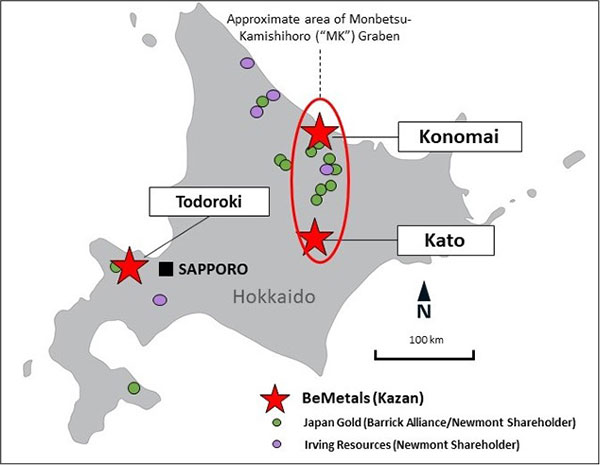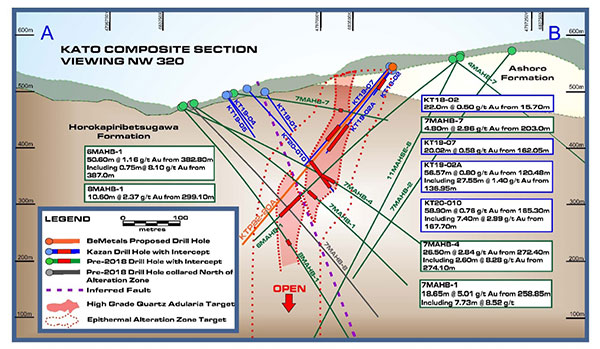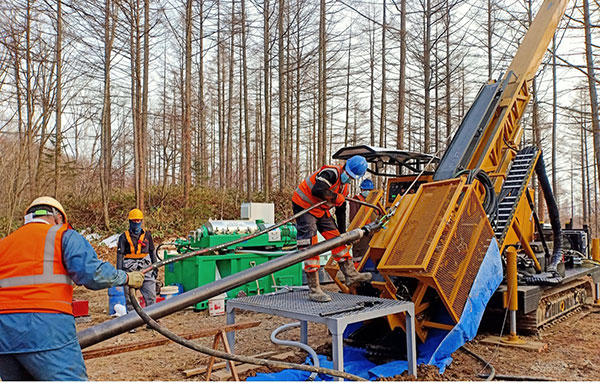BeMetals Commences 2022 Drill Program at the Kato Gold Project in Japan
April 12, 2022
BeMetals Commences 2022 Drill Program at the Kato Gold Project in Japan
Vancouver, British Columbia – BeMetals Corp. (TSXV: BMET, OTCQB: BMTLF, Frankfurt: 1OI.F) (the “Company” or “BeMetals”) is pleased to announce the start of its initial phase of diamond drilling at the wholly owned Kato Gold Project (“Kato” or the “Property”) in Hokkaido, Japan.
HIGHLIGHTS:
- Diamond drilling operations at Kato have commenced on the first hole of a planned 1,500 metre program which is initially designed to test targeted zones of gold mineralization and continuity of high-grade zones of gold mineralization intersected in the 1990s
- The focus will be on targeting an area of historical Japanese state agency drilling that included drill hole 5MAHB-2 which intersected 17.5 metres (m) grading 8.15 grams per tonne (g/t) gold (Au) and hole 7MAHB-1 that intersected 18.65 m grading 5.01 g/t Au. The drill plan will also step out to the southeast to test the strike extension to gold mineralization
- The known footprint of the drilled Kato mineralization is some 600m along strike with significant, multiple gold zones of drilled widths between 2.8 to 58.9m (see table 1) and existing robust targets to potentially extend the strike extent to more than 1,400m
- Energold Drilling, with experience in Japan, shipped a new SDS C1500 drilling rig with a drill mud cleaning system for the Company’s current and future projects to the Kato site. This more powerful rig and advanced drill mud systems, than those used previously at the Project, is expected to significantly improve the penetration through the extensive clay alteration zones associated with high-grade gold zones
John Wilton, President and CEO of BeMetals stated, “We are very excited to have commenced our exploration drilling at the Kato Project in a relatively remote but easily accessible area of Hokkaido in Japan. The Company and its advisors regard the Kato Project as demonstrating many geological and gold mineralization features often associated with significant, high-grade, epithermal gold deposits in Japan. Our technical team has selected a number of high priority drilling targets at Kato for this initial phase of exploration. The primary objective for this phase will be to test target gold zones and their continuity based on historical intersections made by the Japanese state entity Metals Mining Agency of Japan (“MMAJ”) during the 1990s.
Previous drilling efforts conducted between 2018-2020 were hampered by the ability of drilling equipment available at the time to penetrate into and through the extensive zones of clay alteration material on the Property. These altered zones typically surround high-grade gold mineralization in this style of epithermal vein targets, and should be a good indication of robust and extensive gold potential at Kato. In anticipation of drilling through these clay zones to test the high-grade gold targets, we have secured a brand new SDS C1500 drilling rig that has increased power and drilling mud capabilities to previous drilling equipment used at the Project (See Photograph 1 below). This coupled with a drill mud circulation system and a re-designed drill hole development plan, should enable us to penetrate the alteration zones and intersect the high-grade veins of gold mineralization at Kato.”
2022 EXPLORATION PROGRAM IN JAPAN
BeMetals has budgeted approximately US$2.0 million for drilling at the Kazan Gold Project (“Kazan”) in Japan this year. The Kazan portfolio comprises five highly prospective gold projects (including the Kato Project) located on both Japan’s northern island of Hokkaido and southwestern island of Kyushu. The primary focus of our 2022 exploration program will be to drill the Kato Project on Hokkaido where priority drill targets have already been selected. In total, some 1,500 metres are initially planned to be drilled (See Figure 1 for project locations).
Japan suspended entry of foreign travellers from entering the country since start of the COVID-19 pandemic, thus the last drilling to be conducted at the Property was undertaken by Kronk Resources, the previous owners of the Property in 2020. In April 2021, BeMetals acquired Kronk Resources, now BeMetals Corp. Japan, and later in the year contracted Energold Drilling to undertake our 2022 and future drilling campaigns. With the recent lifting of some COVID-19 related travel restrictions into Japan, Energold’s drilling personnel are now able to enter the country and oversee the drilling operations in close association with Tone Engineering Corporation, a well respected Japanese drilling and engineering company. BeMetals has a full complement of geologists, drillers, assistants and additional personnel, many of whom are based in Japan, at site for carrying out the ongoing exploration activities at Kato and our other prospective gold projects in Japan.
In anticipation of encountering potentially challenging rock conditions at Kato, BeMetals has imported through Energold Drilling, a brand new SDS C1500 drill rig. This new rig is expected to significantly improve drill hole development and advancement as we bore through the often softer zones of clay alteration and into harder areas of gold bearing veins. Such altered zones are known to be developed around high-grade gold mineralization found at low sulphidation epithermal gold vein systems in Japan and in other parts of the world (See Figure 2 for targeted area of alteration at Kato Project).
KATO GOLD PROJECT
The Kato Gold Project is BeMetals’ most advanced exploration project in Japan based on the amount of available historical drilling information, and the Property covers close to 2,000 hectares in central Hokkaido. The Kato Project (historically referred to as the Seta River Prospect) is an example of a remarkably well-preserved epithermal gold system. Outcropping of clay-altered units are evidence of a high-temperature steam-heated zone above a hydrothermal gold plumbing system. This mineralization style is an example of a low-sulphidation epithermal system and the classic analogy for this mineralization type in Japan is the Hishikari Gold Mine, on Kyushu Island. Global examples of this type of mineralization include Lihir (Papua New Guinea), Kupol and Julietta (Russia), Waihi (New Zealand) and Masbate (Philippines)*. The Property was previously drilled by the Japanese state agency MMAJ in the 1990s and during that time results included high-grade intervals of gold such as 17.5 metres grading 8.15 g/t Au in hole 5MAHB-2 and 18.65 metres grading 5.01 g/t Au in hole 7MAHB-1. *Please refer to technical report entitled, “Kato Gold Project Japan NI 43-101 Technical Report” with an effective date of July 13, 2021.
From 2018-2020, Kronk Resources drilled several holes that intersected a zone of hydrothermal breccia near the adjacent main alteration target vein. Their results included hole KT19-02A which returned a number of zones of gold mineralization such as 14 metres grading 2.10 g/t Au. In 2020, drilling intersected over 50 metres of clay alteration, hydrothermal breccia, vein breccia, stockwork, and banded quartz-adularia low sulphidation epithermal veins in hole KT20-010. That hole intersected 58.9 metres grading 0.76 g/t Au, including 7.4 metres at 2.99 g/t Au, and ended in 2.8 metres grading 3.1 g/t Au. Due to a lack of bore hole casing the hole was lost in a mineralized zone and is thought to have not intersected the full extent of the high-grade vein target. Table 1 below illustrates highlighted historical gold intersections from the Kato Project. A complete list of drilled intersections at Kato was included in the Company’s news release dated; July 28, 2021, BeMetals Completes Technical Report for the Kato Gold Project in Japan and Identifies Four High Priority Targets for Drilling.
Table 1. Highlighted Historical Gold Drill Intersections at the Kato Project
| Drill Hole ID | From (m) | To (m) | Core Interval (m) | Gold Grade g/t |
| 5MAHB-2 | 314.80 | 332.30 | 17.50 | 8.15 |
| 7MAHB-1 | 258.85 | 277.50 | 18.65 | 5.01 |
| KT19-02A | 120.48 | 177.05 | 56.57 | 0.80 |
| Including | 136.95 | 164.50 | 27.55 | 1.40 |
| Including | 150.50 | 164.50 | 14.00 | 2.10 |
| KT20-010 | ||||
| Interval 1: | 165.30 | 224.20 | 58.90 | 0.76 |
| Including | 167.70 | 175.10 | 7.40 | 2.99 |
| Interval 2: | 229.80 | 232.60* | 2.80 | 3.10 |
These drill results are historical in nature. The main mineralized zone has only been completely crossed by three widely-spaced holes so the orientation and true thickness of the mineralized zone is currently not known. A nominal cut-off grade of 0.5 g/t Au has been applied to determine the boundaries of the intersections. * Drill hole ended in mineralization.
Figure 1: Project Locations Map on Hokkaido
Figure 2: Composite Geological Section Map of Kato Gold ProjectPhotograph 1: SDS C1500 Drill Rig and Mud Circulation System Operating at Kato Gold Project
Table 2. Drill hole, Azimuth, Dip, EOH depth, and Collar Co-ordinates of Historical Core Holes
| Drill Hole ID | WGS84 East | WGS84 North | WGS84 Elevation | Azimuth | Dip | End of Hole Depth |
| 5MAHB-2 | 683611.39 | 4797167.28 | 557.75 | 243 | -38 | 600.1 |
| 7MAHB-1 | 683263.39 | 4796875.81 | 476.87 | 055 | -33 | 500.1 |
| KT19-02A | 683576.81 | 4797052.26 | 535.48 | 245 | -52 | 183.0 |
| KT20-010 | 683424.00 | 4796856.00 | 497.00 | 030 | -45 | 232.6 |
ABOUT BEMETALS CORP.
BeMetals is a precious and base metals exploration and development company focused on becoming a leading metal producer through the acquisition of quality exploration, development and potentially production stage projects. The Company has recently established itself in the gold sector with the acquisition of a portfolio of wholly owned exploration projects in Japan. BeMetals is also progressing both its tier-one targeted, Pangeni Copper Exploration Project in the prolific Zambian Copperbelt, and advancing its high-grade, zinc-silver-gold-copper exploration at the South Mountain Project in Idaho. Guiding and leading BeMetals’ growth strategy is a strong board and management team, founders and significant shareholders of the Company, who have an extensive proven record of delivering exceptional value in the mining sector, over many decades, through the discovery, construction and operation of mines around the world.
QUALIFIED PERSON STATEMENT
The technical information in this news release for BeMetals has been reviewed and approved by John Wilton, CGeol FGS, CEO and President of BeMetals, and a “Qualified Person” as defined under National Instrument 43-101.
ON BEHALF OF BEMETALS CORP.
“John Wilton”
John Wilton
President, CEO and Director
For further information about BeMetals please visit our website at bemetalscorp.com and sign-up to our email list to receive timely updates, or contact:
Derek Iwanaka
Vice President, Investor Relations & Corporate Development
Telephone: 604-928-2797
Email: diwanaka@bemetalscorp.com
Neither the TSX Venture Exchange nor its Regulation Services Provider (as that term is defined in the policies of the TSX Venture Exchange) accepts responsibility for the adequacy or accuracy of this news release
Cautionary Note Regarding Forward-Looking Statements
This news release contains "forward-looking statements" and “forward looking information” (as defined under applicable securities laws), based on management’s best estimates, assumptions and current expectations. Such statements include but are not limited to, statements with respect to future exploration, development and advancement of the South Mountain Project, the Pangeni project and the Japan properties, and the acquisition of additional base and/or precious metal projects. Generally, these forward-looking statements can be identified by the use of forward-looking terminology such as "expects", "expected", "budgeted", "forecasts", "anticipates", "plans", "anticipates", "believes", "intends", "estimates", "projects", "aims", "potential", "goal", "objective", "prospective", and similar expressions, or that events or conditions "will", "would", "may", "can", "could" or "should" occur. These statements should not be read as guarantees of future performance or results. Such statements involve known and unknown risks, uncertainties and other factors that may cause actual results, performance or achievements to be materially different from those expressed or implied by such statements, including but not limited to: the actual results of exploration activities, the availability of financing and/or cash flow to fund the current and future plans and expenditures, the ability of the Company to satisfy the conditions of the option agreements for the South Mountain Project and/or the Pangeni Project, and changes in the world commodity markets or equity markets. Although the Company has attempted to identify important factors that could cause actual results to differ materially from those contained in forward-looking statements, there may be other factors that cause results not to be as anticipated, estimated or intended. There can be no assurance that such statements will prove to be accurate, as actual results and future events could differ materially from those anticipated in such statements. The forward-looking statements and forward looking information are made as of the date hereof and are qualified in their entirety by this cautionary statement. The Company disclaims any obligation to revise or update any such factors or to publicly announce the result of any revisions to any forward-looking statements or forward looking information contained herein to reflect future results, events or developments, except as require by law. Accordingly, readers should not place undue reliance on forward-looking statements and information. Please refer to the Company’s most recent filings under its profile at www.sedar.com for further information respecting the risks affecting the Company and its business.



